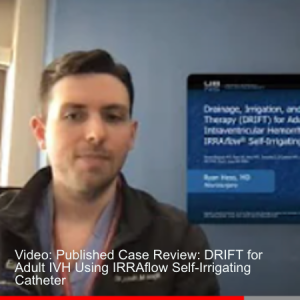
1.6K
Downloads
10
Episodes
The IRRAS Radio podcast provides an informative exploration of cutting-edge technology in the neurocritical care space. Host, John Unser, interviews thought leaders from around the world to discuss the latest trends in the treatment of patients suffering from traumatic brain injury and intracranial bleeding. Topics include relevant clinical data, current treatment options, and personal clinical experience.
Episodes

Thursday Aug 04, 2022
Thursday Aug 04, 2022
Dr. Brandmeir, a neurosurgeon from WVU Hospital and the WVU Rockefeller Neuroscience Institute, presents his early experience utilizing IRRAlfow and demonstrates the positive clinical outcomes seen with his case reviews.
Presentation Outline:
- Why do we need a better EVD?
- What is IRRAflow, and how does it work?
- How he uses IRRAflow in the ICU?
- What are some outcomes that you can expect with IRRAflow?
Case Reviews: - cSDH treated with IRRAflow
- IVH treated with EVD
- IVH treated with IRRAflow and tPA
- IVH with IPH treated with IRRAflow and tPA
- IVH treated with IRRAflow and tPA with endoscopic photos
- Abscess treated with IRRAflow with antibiotic

Thursday Aug 04, 2022
Thursday Aug 04, 2022
Intracranial abscesses are rare lesions with an incidence estimated at 1500-2500 cases per year in the United States. Widespread use of neuroimaging has led to rapid diagnosis, decreasing the mortality rate from 40-50% to approximately 20. Treatment options include systemic antibiotic therapy, needle aspiration through a burr hole, and open craniotomy for excision.
The recently introduced IRRAflow self-irrigating catheter system has been used to treat subdural hematomas and intraventricular hemorrhages although research into other applications for this technology is still ongoing.
Dr. Ryan Hess, neurosurgeon form Buffalo General Hospital presents a case review of an intracranial abscess treated via open craniotomy and IRRAflow placement allowing for continuous irrigation and drainage of the abscess.
Read more here: https://www.cureus.com/articles/68647...

Thursday Aug 04, 2022
Thursday Aug 04, 2022
Intraventricular hemorrhage (IVH) is a devastating neurosurgical condition associated with high rates of morbidity and mortality. It can occur as the result of several pathologies and typically presents with mental status changes, neurologic deficits, seizures, headaches, and decreased Glasgow Coma Scale score. These patients are often treated with placement of an external ventricular drain, which helps decrease the clot burden; however, they commonly clot off leading to multiple exchanges.
Dr. Ryan Hess, neurosurgeon form Buffalo General Hospital presents a case review in which drainage, irrigation, and fibrinolytic (DRIFT) therapy using IRRAflow® (IRRAS) irrigating catheter was used to treat a patient with severe IVH secondary to aneurysmal subarachnoid hemorrhage.
Read more here: https://www.cureus.com/articles/57776...

Thursday Aug 04, 2022
Video: Behnam Rezai Jahromi, MD Presents at AANS 2022
Thursday Aug 04, 2022
Thursday Aug 04, 2022
Dr. Behnam Rezai Jahromi a neurosurgeon from Helsinki University Hospital presents his clinical experience utilizing IRRAflow to treat IVH and Ventriculitis patients with drug delivery.

Wednesday Aug 05, 2020
Episode 2: Insightful Discussion about Health Care Costs Due to EVD Infections
Wednesday Aug 05, 2020
Wednesday Aug 05, 2020
Neurosurgeon Dr. Kurt Yaeger, from Mt. Sinai Hospital in New York, New York, shares insight to being a healthcare worker on the front lines of the COVID-19 pandemic and provides an overview of his recent publication in World Neurosurgery, Patterns of Health Care Costs Due to External Ventricular Drain Infections.
Additional Information about this study can be found below.
Background: External ventricular drain (EVD) infections are a significant cause of morbidity among neurosurgical patients and have been correlated with increased length of hospital stay and longer requirements for intensive care. To date, no studies have examined the financial impact of EVD infections.
Methods: Patients who underwent EVD placement between December 2010 and January 2016 were included in the study. Clinical records were retrospectively reviewed and health care cost data were obtained from the hospital's finance department. Clinical information included patient demographics, details from the hospital course, and outcomes. Total costs, direct/indirect, and fixed/variable costs were analyzed for every patient.
Results: Over the 5-year study period, 246 EVDs were placed in 243 patients with an overall infection rate of 9.9% (N = 24). The median EVD duration for infected versus noninfected patients was 19 and 9 days, respectively (P < 0.0001). Median length of intensive care unit stay also was increased for patients with EVD infection (30 days vs. 13 days, P < 0.0001). Total health care costs were significantly greater for infected patients (US$ 168,692 vs. US$ 83,919, P < 0.0001). This trend was comparable for all other cost subtypes, including fixed-direct costs, fixed-indirect costs, variable direct costs, and variable-indirect costs.
Conclusions: EVD infection has a substantial effect on clinical morbidity and healthcare costs. These results demonstrate the imperative need to improve EVD infection prevention, particularly in the setting of a value-based health care system.

Friday Apr 17, 2020
Video: IRRAflow® Wins CONNECT’s ”2019 Most Innovative New Product” Award
Friday Apr 17, 2020
Friday Apr 17, 2020
IRRAflow was selected as the 2019 winner of CONNECT's Most Innovative New Product award in the medical device category. CONNECT, a premier nonprofit helping entrepreneurs with innovative startups in the technology and life sciences sectors, has been celebrating innovation leaders in the broader San Diego area for the last thirty-two-years.
IRRAflow, the company's initial commercial product, has a unique mechanism of action that addresses the complications associated with the current methods of managing intracranial fluid by using a dual-lumen catheter that combines automated irrigation, controlled drainage, and continuous ICP monitoring, all into one system.

Wednesday Apr 15, 2020
Episode 4: Therapeutically Treating Ventriculitis
Wednesday Apr 15, 2020
Wednesday Apr 15, 2020
Dr. Behnam Rezai Jahromi is currently a resident at Helsinki University Hospital in Helsinki, Finland, where he joined the world-renown neurosurgery department while attending high school. Dr. Rezai Jahromi has published more than 70 peer-review articles, has written 20 book chapters, and is running several intranational clinical studies regarding cerebrovascular disorders.
In this episode, Dr. Rezai Jahromi discusses his clinical experience with treating patients suffering from ventriculitis and shares how new innovative technology called IRRAflow, provides a needed change to therapeutically treating this disease.
In this informative episode, Dr. Rezai Jahromi discusses:
- How ventriculitis affects the ventricles of the brain
- Current standard of care for treating ventriculitis and the associated issues with these treatments
- Benefits of using IRRAflow to remove bacterial mass and deliver antibiotics within the ventricles
- Ventriculitis patient clinical success story
- Key takeaways for neurosurgeons treating patients suffering from ventriculitis
- How IRRAflow will continue to shape treatment approaches in the future

Tuesday Apr 14, 2020
Episode 3: Understanding Intraventricular Hemorrhage (IVH)
Tuesday Apr 14, 2020
Tuesday Apr 14, 2020
Neurointensivist Dr. Farrukh Chaudhry, FAAN, FNCS, from Community Health System in Muster, IN, discusses his clinical experience with treating patients suffering from intraventricular hemorrhages (IVH).
In this educational episode, Dr. Chaudhry covers:
- Two main methods used to treat IVHs
- Common complications associated with the current methods
- The CLEAR-III IVH Trial and treating IVH with tPA
- Length of hospital stay for patients with IVH
- The benefits of utilizing IRRAflow and tPA to therapeutically treat IVH

Wednesday Apr 08, 2020
Video: Who is IRRAS?
Wednesday Apr 08, 2020
Wednesday Apr 08, 2020
IRRAS is a global medical care company focused on delivering innovative medical solutions to improve the lives of critically ill patients. IRRAS designs, develops, and commercializes neurocritical care products that transform patient outcomes and decrease the overall cost of care by addressing complications associated with current treatment methodologies.
IRRAS markets and sells its comprehensive, innovative IRRAflow and Hummingbird ICP Monitoring product lines to hospitals worldwide through its direct sales organization in the United States and select European countries as well as an international network of distribution partners.

Wednesday Apr 08, 2020
Episode 1: A Novel Approach for Treating Chronic Subdural Hematomas
Wednesday Apr 08, 2020
Wednesday Apr 08, 2020
Dr. Sumeet Vadera, Associate Professor of Neurological Surgery at UC Irvine Health, discusses his experience using new technology to treat a patient suffering from a Chronic Subdural Hematoma.
